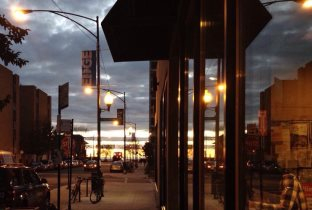Another interview here for you, this time from a guest from just over a week back, Tevo Howard. We tried to squeeze this one in before the party, but alas Tevo is a busy man these days, and his schedule couldn’t allow for it. But here he is talking about Chicago, literature, Traxx, Resident Advisor and more.
Mister Saturday Night: Your recent RA podcast was a beautiful piece of work. Congratulations! Getting an RA podcast these days seems to a real milestone in an artist’s career. Have you noticed an effect yet, or is it too soon to say?
Tevo Howard: Thank you for the kind words. I did take good time doing the RA Podcast, and it was great to work with them. I have seen some trickle from the podcast, and am excited looking forward.
MSN: The original sounds and aesthetics of Detroit and Chicago are very dear to us at Mister Saturday Night. In recent years there has been a resurgence of Detroit artists not only playing out and being appreciated but also making new music in keeping with those original values. We’re not sure the same can be said for Chicago, which is why your work and the work of your contemporary Traxx is very exciting to us, but that’s were it seems to stop. Why do you think there isn’t more music emanating from Chicago right now?
TH: Chicago as a town is a quirky place. Even its name “Chicago” meaning “Sticky Onion” in a Native American Indian Language, points at peculiarity. Actually, in my opinion, the town is ahead of its time in many aspects, aside from pushing a worldwide movement for the dance music genre [from the] late 70s through early to mid 90s. Today, Chicago has simply taken a less subjective look, and approaches a more objective one pertaining to popular music. It is less likely to find a club in Chicago that plays Chicago house music, than it is to find a club that plays an array of genres and tempos. That is a quirky fact, but that is the way Chicago is today, and I still believe the place to be ahead of its time. There are many great artists coming out of Chicago, but not so many in the house music genre. I will note, though, that no DJs in the world can quite do it like Chicago can, and there are many local DJs that wreck shop on the tables playing all genres, or a mixed bag.
MSN: We’re very excited because your live set this weekend will comprise a healthy involvement of real hardware. How important is it to you to incorporate this gear into a live performance vs. playing a standard live set?
TH: When I set out to program my live set, I simply used all that I could find to incorporate from my studio. I do recall thinking that It would be awesome to have a few drum machines linked together, but decided against it for practical reasons. Recently, I added the Tr-606 to my live set, but because of technical problems it has been set aside. Ultimately, I rely heavily on the programming of the drum machines, rather than which drum machines are used. You can use any drum machine in the world, and have terrible material on them, and get nowhere. Programming and tonal composition are the most important to a good track,
MSN: We learned very recently that you’re a writer. We love nothing more than a good book (although finding the time these days is a challenge). What are you favorite works of fiction?
TH: I used to read a lot of Hemmingway, but my favorite book officially is “A Confederacy of Dunces”. That’s a great book.
